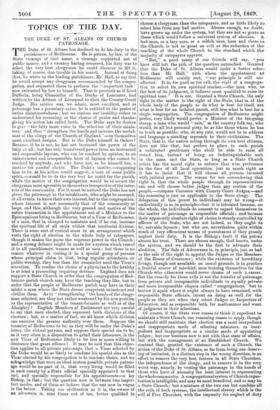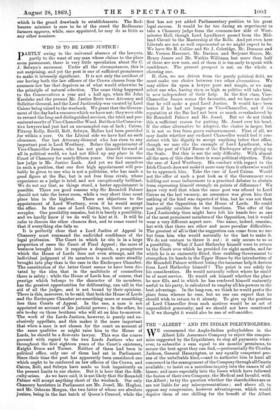TOPICS OF THE DAY.
THE DUKE OF ST. ALBANS ON CHURCH PATRONAGE.
THE Duke of St. Albans has declined to do his duty to the parishioners of Redbourne. He is patron, by law, of the State vicarage of that name, a vicarage supported out of public money, and a vacancy having occurred, his duty was to select the very best clergyman he could discover to fill it, taking, of course, due trouble in his search. Instead of doing that, he wrote to the leading parishioner, Mr. Hall, to say that he would accept any clergyman recommended by the congre- gation, and requested them to perform the "important task" now entrusted by law to himself. That is precisely as if Lord Dufferin, being Chancellor of the Duchy of Lancaster, had written to the debtors of Liverpool to elect the County-Court Judge. His motive was, we admit, most excellent, and as patronage has a pecuniary value, he is entitled to the praise of entire disinterestedness ; but we confess our inability either to understand his reasoning, or the chorus of praise and thanks- giving his action has called forth. The Duke says he desires to give "the laity more voice in the selection of their minis- ters," and thus "strengthen the hands and increase the useful- ness of the clergy of the Church of England,"—in themselves most excellent designs. But is the Duke himself in Orders ? Because, if he is not, he has not increased the power of the laity at all ; but has only transferred power from an instructed and responsible layman, who can be reached by opinion, to an uninstructed and irresponsible knot of laymen who cannot be reached by anybody, and who have not, as he himself has, a motive for careful choice. The Duke's motive,—supposing him to be, as his action would suggest, a man of some public spirit,—would be to do the very best he could for the parish, while the motive of the congregation would be to secure the clergyman most agreeable to themselves irrespective of the inter- ests of the community. For it must be noticed the Duke has not given the patronage to the inhabitants, who might be assumed, at all events, to know their own interest, but to the congregation, whose interest is not necessarily that of the community at large, and this, although the very ground and motive of the entire transaction is the appointment not of a Minister to the Episcopalians living in Redbourne, but of a Vicar of Redbourne, of a man, that is, charged to maintain and, if he can, increase the spiritual life of all souls within that territorial division. There is some sort of cynical sense in an arrangement which vests the right of election in the whole body of ratepayers, though it makes the purse the supreme power in the Church ; and a strong defence might be made for a system which vested it in all parishioners, women as well as men ; but there is no reason whatever in vesting it in a special group of persons whose principal claim is, that, being regular attendants on public worship, they less than the remainder need the Vicar's attention. To confine the choice of a physician to the healthy is at least a proceeding requiring defence. England does not support a State Church in order that the congregation of Red- bourne parish church may have the teaching they like, but in order that the people of Redbourne parish may have in their midst a man whom the State deems competent to instruct and civilize them. As to " strengthening " the hands of the clergy- man selected, are they not rather weakened by his new position as the representative of the tenant-farmers as well as of the Almighty ? English Members of Parliament are very careful to say that once elected, they represent both divisions of the electors ; but, as a matter of fact, we all know which division can exercise the greater authority over them. Suppose the tenantry of Redbourne to be, as they will be under the Duke's letter, the virtual patrons, and suppose their special sin to be, as it very often is, a disposition to grind their labourers, is the new Vicar of Redbourne likely to be less or more willing to denounce that great offence ? It may be said that this objec- tion applies to all private patronage, that a Vicar selected by the Duke would be as likely to condone his special sins as the Vicar elected by his congregation is to condone theirs, and we acknowledge that were an ideal system possible, private patron- age would be no part of it, that every living would be filled in each county by a State official specially appointed to that end, and specially responsible for his appointments—a lay Bishop, in fast; but the question now is between two imper- fect modes, and of them we believe that the one now in vogue is the better. Taking our civilization as it is, the owner of an advowsou is, nine times out of ten, better qualified to choose a clergyman than the ratepayers, and as little likely to select him from any bad motive. Abuses enough, no doubt,
have grown up under the system, bat they are not so grave as those which would follow a universal system of election. A. bad man, or a lazy man, or a selfish man, here and there in.
the Church, is not so great an evil as the reduction of the teaching of the whole Church to the standard which the majority of ratepayers approve.
"But," a good many of our friends will say, "you have still left the pith of the question untouched. Granted that the Duke of St. Albans would make a better selec- tion than Mr. Hall," with whom the appointment at Redbourne will mainly rest, "our principle is still un- affected. It is, for good or for evil, the right of a congrega-
tion to select its own spiritual teacher,—the man who, to. the best of its judgment, it believes most qualified to raise its.
spiritual tone." It is not. Granted a State Church, the only
right in the matter is the right of the State, that is, of the whole body of the people to do what is best for itself, not what is best for an isolated parish, still less what is best for a single congregation. The congregation of Redbourne might
prefer, very likely would prefer, a Minister of the tea-going stamp, a man who would "mix," as the country folk say, who would, in all but personal piety, be as like those whom he has to teach as possible, who, at any rate, would not be in address and language a standing reproach to their civilization. The State, that is, the nation acting through its own best citizens; does not like that, but prefers to place in each parish a cultivated gentleman who shall be able to raise all round him, instead of being an indistinguishable unit in the mass, and the State, so long as a State Church exists, has the moral right to enforce that wise preference in the face of all local opposition, just as much right as it has to insist that it will choose all persons invested with judicial power. The reason for not surrendering that right is, that the whole people through its representatives. can and will choose better judges than any section of the people,—compare Coroners with County Court Judges,—and the reasoning is just as applicable to the State clergy. The delegation of this power to individuals may be wrong—it undoubtedly is so in principle—but it is tolerated because, on the whole, the individuals do consent to regard themselves in. the matter of patronage as responsible officials ; and because their apparently absolute right of choice is sternly controlled by officers of the State, who are not indeed, as they ought to be, movable laymen ; but who are, nevertheless, quite within.
reach of very efficacious means of punishment if they grossly neglect their duty. It is the Bishop's fault if the patron abuses his trust. There are abuses enough, God knows, under the system, and we should be the first to advocate their abolition. The Sale of Advowsons is, in principle, just as bad. as the sale of the right to appoint the Judges or the Members of the House of Commons ; while the existence of hereditary livings, though not assailable on moral grounds, is in practice a fruitful source of mischief, men training themselves for the Church who otherwise would never dream of such a career.
Butthe remedy for these evils is not the transfer of patronage, from private and irresponsible individuals to equally private.
and more irresponsible cliques called "congregations," but to bestow it again where it ought always to have remained, with responsible State officials, intent on doing as well for the people as they are when they select Judges or Inspectors of Education, and as responsible both for malfeasance and want of judgment in their selections.
Of course, if the State ever ceases to think it expedient to. maintain a State Church, our reasoning ceases to apply, though we should still maintain that election was a most inexpedient and inappropriate mode of selecting ministers, as inex- pedient and inappropriate as a similar mode of appointing judges ; but our business now is not with that state of affairs, but with the management of an Established Church. We contend that, granted the existence of such a Church, the action of the Duke of St. Albans, so far from being one deserv- ing of imitation, is a distinct step in the wrong direction, is an effort to remove the very best feature in all State Churches, the independence of the clergy, and to remove it in the very worst way, namely, by vesting the patronage in the hands of those who have of necessity the least interest in representing thewholecommunity. A congregationalsystem of Church organ- ization is intelligible, and may be most beneficial, and so may be a State Church; but a mixture of the two can but combine all the evils of both systems, the intellectual slavery which is the evil of Free Churches, with the impunity for neglect of duty
which is the grand drawback to establishments. The Red- bourne minister is sure to be of the creed the Redbourne farmers approve, while, once appointed, he may do as little as any other nominee.































 Previous page
Previous page